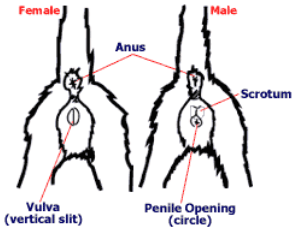QuestionDear Ellen,
Recently, my 3 year old pit bull, chocolate lab mix, Lady, tested positive for heartworm. My vet said it was a weak positive so he wanted to take more blood and send it to the lab. While I waited for the vet to contact me with the lab results, I started doing research on the treatment of heartworm. I was leaning toward a herbal treatment. I contacted the vet to get the results from the lab test. That test was also postive. I asked them what exactly did the results show, microfilaria or adults or what. I was told that the results just showed positive, that was all the lab sent them. I told them I really needed to know because I was looking into alternative treatments. Then they said, Lady probably has both microfilaria and adults, and if I brought her to them, they would treat her for both.
My question to you is, does the lab test just show positive or would it show what type of heartworm? If it doesn't show the type of heartworm, shouldn't the vet be able to get that info from the lab and in turn provide me with that information?
Thank you for your time and have a great day!
Sincerely,
Christine K.
West Palm Beach, FL
AnswerHI there
First of all you need to understand that heatworm disease is DEADLY. As far as I know in the veterinary community there is NO herbal treatment for this. PLUS if its not FDA approved you are not going to get a true drug dosage.
Your dog has dirofilaria immitis. If you dog is positive for heartworm, it most likely has adults and microfilaria. A quick microfilaria test is looking at a drop of red blood under a microscope and looking for the actual worm movment. The testing thats run at labs are antibodies and antigen tests. If they come up + your dog has heartworm disease.
The newest treatment is called Immiticide. It kills both adults and microfilaria. Its a series of 3 injections in the low back and your dog is watched during the day for any kind of respitory (yes, because heartworms migrate throught the body via circulatory sysytem) and cardiac distress.
Your dog will then after treatment be placed on heartworm preventative PERMANANTLY so this does not occur again. This is VERY important. Once your pet has heartworm disease, there is damage to the heart.
Stick with the medical treatment by your vet if you want a better outcome.

 Puppy wont eat
QuestionHello, i have a 8 week old golden retriever and
Puppy wont eat
QuestionHello, i have a 8 week old golden retriever and
 My Finch Had an Incident and Im Not Sure What To Do
Question
Injury Spot on Male Fi
Dear Jana Connel
My Finch Had an Incident and Im Not Sure What To Do
Question
Injury Spot on Male Fi
Dear Jana Connel
 dog breathing heavily through nose
Question
Camo Camo
Hello, I have a male Am
dog breathing heavily through nose
Question
Camo Camo
Hello, I have a male Am
 kitten not using litter box, but sleeps in it
QuestionHi. We just got a new kitten. It is 9 weeks old
kitten not using litter box, but sleeps in it
QuestionHi. We just got a new kitten. It is 9 weeks old
 My old cat whos not eating well after dental surgery
Question
timmy since his surger
Hi, Im really worried a
My old cat whos not eating well after dental surgery
Question
timmy since his surger
Hi, Im really worried a